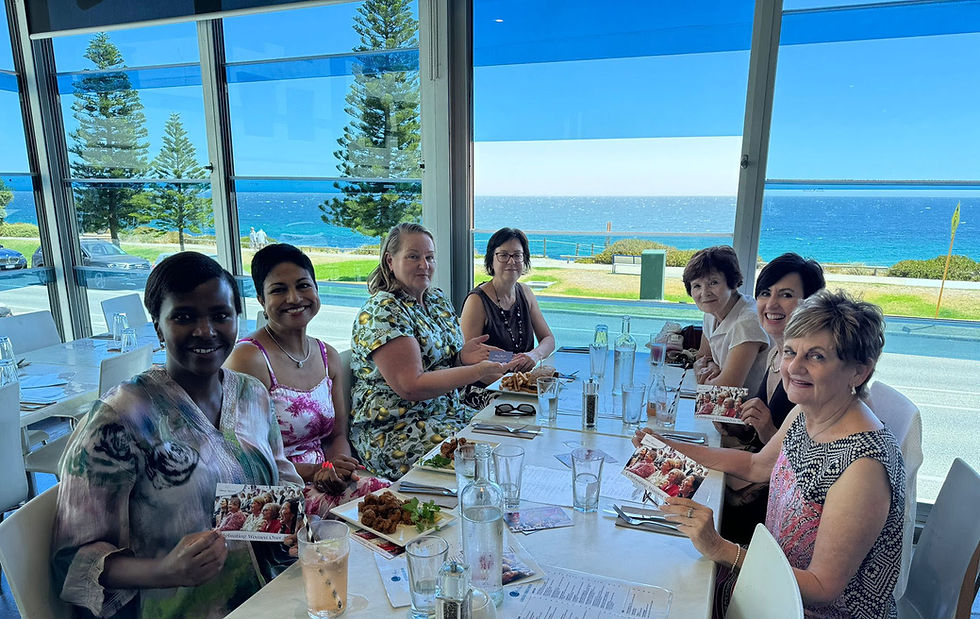Don't call me 'darlin'!
- Nov 8, 2023
- 3 min read

Some guy said to me: "Don't you think you're too old to sing rock'n'roll?"
I said: "You'd better check with Mick Jagger."
Cher
I was at a new hairdressing salon recently, to have a few of my (ahem) ‘natural highlights’ blended in with the rest of my shoulder-length blonde hair. It was a fairly up-market affair, with a fabulous décor. I had chosen this particular salon, because as I was heading up to my 60th birthday, I decided to treat myself, and thought I would spend the extra money because, well, I deserve it!
While I waited for my stylist, I noticed the other clients (who looked to be in their 30s) being offered a glass of wine, and even though I don’t drink alcohol, I thought it was a lovely way for the salon to pamper their clientele, and I considered switching to this salon permanently.
A young woman (I am guessing in her early 20s) appeared behind me and said:
“Hello darlin’, what are we having done today?”
I explained that I wanted a colour and trim, and she looked a bit doubtful, and then said:
“Have you considered going short? It might be more suitable at your age and would be much easier for you to handle. Now, you just rest here, and I’ll go mix your colour darlin’. And I’ll get one of the girls to bring you a nice cup of tea.”
This was not the treatment I had envisaged for myself! I can laugh about the encounter now, but at the time I was more than a little miffed! The fact that she obviously considered me too feeble to be able to manage my own hair was bad enough, but the condescension of ‘darlin’ being served a ‘nice cup of tea’ , without the offer of a wine, was just too much.
In all fairness to this young lady, she was probably taught to be nice to the 'old' ladies, and thought she was doing just that. But how do we help the upcoming generations to recognise that just because we are older, we have not lost our mental capabilities, and should be treated exactly the same way, and spoken to the same way, as younger people? Why are we suffering these faux pas in silence?
One woman whom I admire greatly, and who is challenging Ageism in Australia today, is prominent Australian journalist and media personality, Ita Buttrose. Her efforts to raise awareness about age discrimination are making a significant impact on shifting societal attitudes.
In her own words, she recounts an incident that deeply affected her:
"I remember being dismissed by a colleague in my early 60s, who suggested I was 'past my prime.' That experience was a turning point for me. It made me realize that ageism is not just a social issue; it's a deeply ingrained bias that needs to be challenged."
As the Chair of the Australian Broadcasting Corporation (ABC) and through her appearances on various television programs, Ms Buttrose has used her platform to challenge stereotypes and promote inclusivity. She has called for greater representation of older individuals in media, noting that diverse voices and perspectives are essential for a well-rounded society.
"In the media industry, we need to see more older faces on our screens and hear more diverse voices. It's not just about age; it's about recognising the value that comes with experience and a lifetime of learning," Ms Buttrose said.
Ms Buttrose's work extends beyond media advocacy. She has actively engaged with organisations and initiatives aimed at addressing age discrimination in the workplace and healthcare. She understands that systemic changes are necessary to combat ageism comprehensively.
But what can we, as ordinary women aged 50 and over, do to promote Anti Ageism and greater understanding between the generations?
Perhaps we need to stop suffering in silence, and gently correct misconceptions about what is and isn’t acceptable treatment and behaviour cross-generationally. Lead by example and show how we can support each other, without judgement or condescension and build mutual understanding and respect.
And stop calling me ‘darlin’.
Jody Webster




Comments